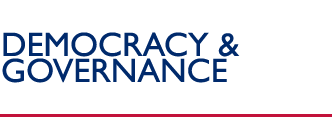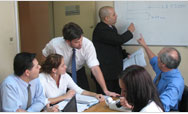 |
Promoting More Genuine and Competitive Elections & Political Processes
 Free and fair elections are vital to a functioning democracy. When a country is emerging out of a protracted civil war, or in cases where a country's government has lost the confidence of its citizens, it is often necessary to hold elections very quickly. USAID helps in these situations in many ways, including:
Free and fair elections are vital to a functioning democracy. When a country is emerging out of a protracted civil war, or in cases where a country's government has lost the confidence of its citizens, it is often necessary to hold elections very quickly. USAID helps in these situations in many ways, including:
- conducting pre-election assessments
- training election commissions, poll watchers, & international election observers
- developing civic and voter education techniques
- developing programs to address gender, minority, and ethnic issues.
Regardless of the type of assistance given, the goal is always the same -- to insure a free and unbiased election.
USAID also provides longer-term assistance to newly emerging democracies that may lack the institutional capacity to support, organize, and carry out elections, to properly organize political parties, or to educate their citizens concerning the political process and the mechanics of voting. USAID programs to address these problems include election planning and implementation, political party development, voter education, and support for domestic and international monitoring groups. The goal here is to help countries institutionalize the appropriate political procedures that will help ensure a stable, democratic system.
Competitive political parties are central to any democracy. They perform a number of functions that, in combination, distinguish them from any other civic or social organization. They recruit and nominate candidates for elected office with the intent to govern. In the process, they develop positions on issues of public concern, stimulate public discourse, and formulate governing platforms during election campaigns. After an election, parties form either the government or the opposition. Governing requires a different set of capabilities to translate electoral platforms into performance. The credibility and legitimacy of political parties in the public mind rest primarily on performance while in office rather than on election campaigns.
The goals of USAID's political party assistance are to:
- Develop and consolidate representative democracies,
- Develop transparent political environments,
- Establish viable democratic parties, and
- Ensure conduct of free and fair elections.
Political party assistance is a new USAID policy priority, one that requires commitment and innovation. For more information on this policy, review the publication USAID Political Party Assistance Policy. This policy defines a political party as any entity that competes for elected office, whether a political movement, party, electoral coalition, or alliance. The policy also applies to nongovernmental organizations (NGOs) that operate as de facto political parties.
Back to Top ^
|


